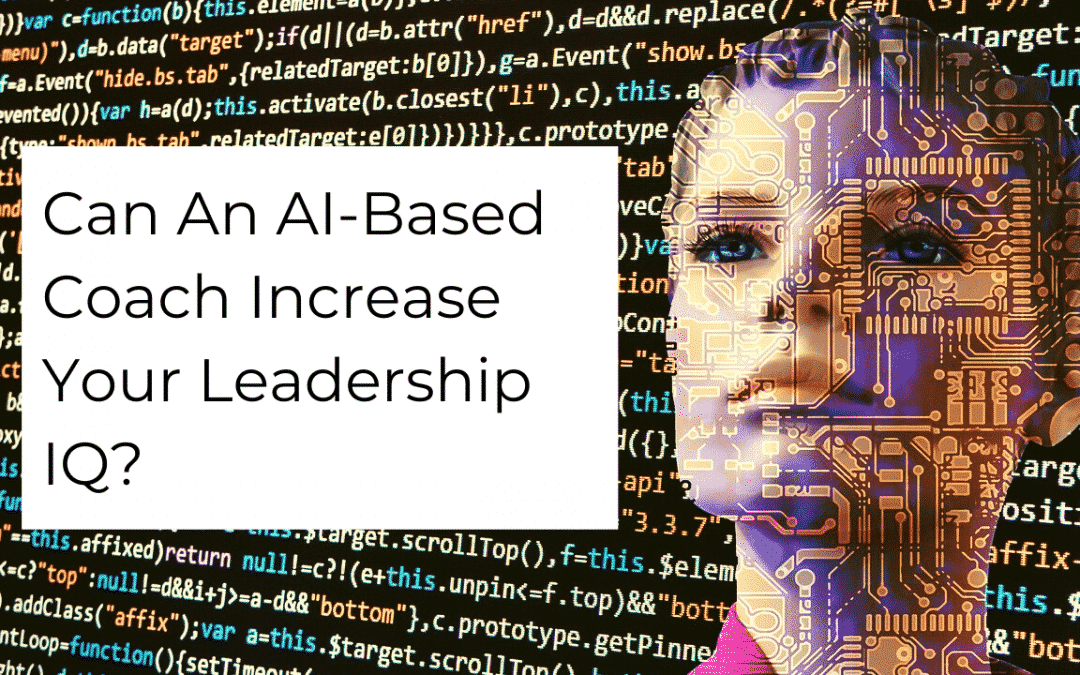Can An AI-Based Coach Increase Your Leadership IQ?

This article was first published on Forbes.com
After reading a recent Wall Street Journal article about the future of online coaching, I decided to test it out. I signed up for an AI-based coaching service for managers called LEADx.
To begin, I answered a few questions and then started having a conversation with “Coach Amanda.” It looked like we were texting back and forth, but Amanda was helpful enough to give me a choice of answers, so I didn’t have to think too hard in our text exchange — the same way LinkedIn does with its messaging.
Then, Coach Amanda suggested a video to me, and it was a great video! It explained why managers need to stop being Superman, flying in to rescue their teams and saving the day. Instead, they need to cultivate more Yoda-like wisdom in their leadership and help their direct reports find the wisdom in themselves the same way Yoda helped Luke. I really liked this analogy. I work with metaphors and distinctions a lot with my clients, and it can be helpful to people as a way to observe their effectiveness. You can regularly ask yourself, “Am I being more like Superman or Yoda in this moment?” In the beginning, I was really looking forward to engaging with this new, innovative way of coaching.
A week in, I began to notice how every day or two I would get a ping from Coach Amanda. It would say something along the lines of, “Have you thought about how to coach your employees?” or “This week, give people constructive feedback as soon as you can chat privately. If you see something, say something. To learn more, here’s a link to a video.” When I saw the notification come up on my screen, I thought, “OK, that’s a good reminder. I should give people feedback right away.”
Another time Coach Amanda suggested that “sometimes extroverts aren’t the best listeners, so practice active listening, especially in one-on-one meetings.” Once again, I could go online and watch a video. The videos were high quality and well-produced. The service had summaries of books, which I also found to be really helpful. And they offer a great resource library if you take the time to search for advice on a specific topic.
Sometimes I clicked on the video. Then when I saw it was 5-10 minutes long, I thought, “I don’t have time to watch this now. I’ll watch it later.” Over time, the more these emails came in and the more I ignored them, the more I realized I had developed a habit of ignoring Coach Amanda. So, while I had signed up because I was genuinely interested in engaging and seeing what advice she gave, I realized that the prompts themselves quickly became just another interruption in my day.
To be clear, I am not this service’s target market. Their target market is newer managers and leaders. I can’t tell you if, from that newer manager or leader’s point of view, it would be really helpful to have reminders throughout their day to focus a bit more on their people management skills. It might very well be the case for some people.
The question that remains for me, however, is whether new managers and leaders are going to take the time to go to the website to listen to the videos and invest in learning this information. The truth is, there’s already a wealth of information out there on managing up, down and across. And it’s often free. Sites like the Harvard Business Review or The Muse — which is particularly good for millennials — have a lot of great articles targeted at newer managers. You can also check out one of the many books for new managers at your local library or bookseller.
My hunch is that for most managers, Coach Amanda will be one more great resource they are ignoring. I am not sure whether this virtual drip content, while it can spoon-feed bite-sized chunks of learning, will in the long run reach new managers with any more information. Rather, it’s more likely to just be one more source of pressure for new managers and leave them feeling behind.
I turned to a wise colleague Kate Neville, who also delved into the realities of AI coaching, and she summarized it best. “An AI coach can be useful in helping someone stay accountable and keep in mind new ways of doing things they want to try, if automatic reminders and calendar deadlines are enough to prompt them to act. What AI coaches can’t do is help someone identify what is getting in the way of their progress and develop different approaches or practices to try something different in their lives, which is typically how change happens. That requires a human coach who can have conversations that provide new perspectives and tailor coaching to the particular situation faced by another human.”
While I do look forward to a day when people below the executive suite have easy access to amazing coaching, I don’t believe that, at this point in its development, AI-based coaching services meet that need.